Big Red Book
Celebrating television's This Is Your Life
November 1957
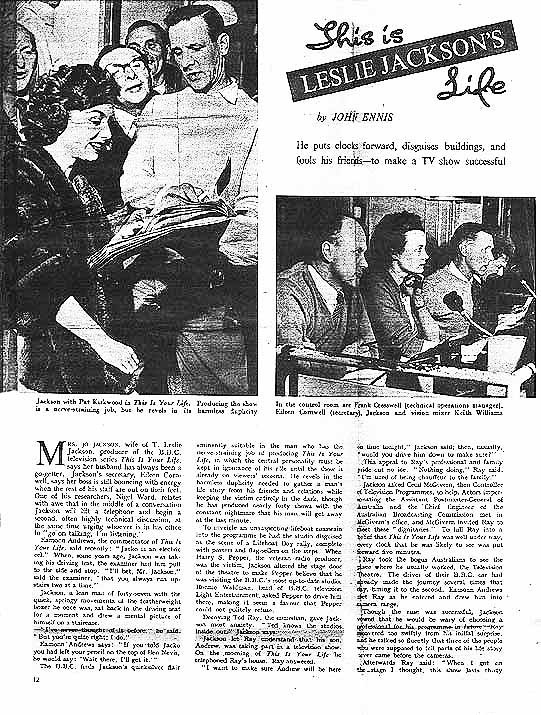
the producers who steered the programme's success
Press obituaries for This Is Your Life's first producer
Stories behind This Is Your Life
a review of the second series
a review of the first series
the man who created it all
by JOHN ENNIS
He puts clocks forward, disguises buildings, and fools his friends – to make a TV show successful.
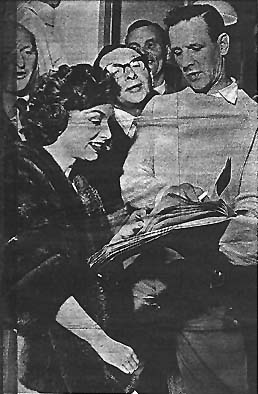
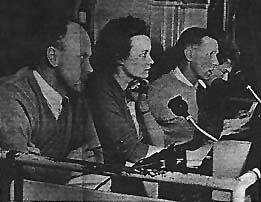
Mrs Jo Jackson, wife of T Leslie Jackson, producer of the BBC television series This Is Your Life, says her husband has always been a go-getter. Jackson's secretary, Eileen Cornwell, says her boss is still bouncing with energy when the rest of his staff are out on their feet. One of his researchers, Nigel Ward, relates with awe that in the middle of a conversation Jackson will lift a telephone and begin a second, often highly technical discussion, at the same time urging whoever is in his office to "go on talking, I'm listening."
Eamonn Andrews, the commentator of This Is Your Life, said recently: "Jacko is an electric eel." When, some years ago, Jackson was taking his driving test, the examiner had him pull to the side and stop. "I'll bet, Mr Jackson," said the examiner, "that you always run up stairs two at a time."
Jackson, a lean man of forty-seven with the quick, springy movements of the featherweight boxer he once was, sat back in the driving seat for a moment and drew a mental picture of himself on a staircase.
"I've never thought of it before," he said. "But you're quite right, I do."
Eamonn Andrews says: "If you told Jacko you had left your pencil on the top of Ben Nevis, he would say: 'Wait there, I'll get it'"
The BBC finds Jackson's quicksilver flair eminently suitable in the man who has the nerve-straining job of producing This Is Your Life, in which the central personality must be kept in ignorance of his role until the show is already on viewer's screens. He revels in the harmless duplicity needed to gather a man's life story from his friends and relations while keeping the victim entirely in the dark, though he has produced nearly forty shows with the constant nightmare that his man will get away at the last minute.
To inveigle an unsuspecting lifeboat coxswain into the programme he had the studio disguised as the scene of a Lifeboat Day rally, complete with posters and flag-sellers on the steps. When Harry S Pepper, the veteran radio producer was the victim, Jackson altered the stage door of the theatre to make Pepper believe that he was visiting the BBC's most up-to-date studio. Ronnie Waldman, head of BBC television Light Entertainment, asked Pepper to drive him there, making it seem a favour that Pepper could not politely refuse.
Decoying Ted Ray, the comedian, gave Jackson most anxiety. "Ted knows the studios inside out." Jackson says.
Jackson let Ray understand that his son, Andrew, was taking part in a television show. On the morning of This Is Your Life he telephoned Ray's house. Ray answered.
"I want to make sure Andrew will be here on time tonight." Jackson said; then, casually, "would you drive him down here to make sure?"
This appeal to Ray's professional and family pride cut no ice. "Nothing doing," Ray said. "I'm tired of being chauffeur to the family."
Jackson asked Cecil McGivern, then Controller of Television Programmes, to help. Actors impersonating the Assistant Postmaster-General of Australia and the Chief Engineer of the Australian Broadcasting Commission met in McGivern's office, and McGivern invited Ray to meet these "dignitaries." To lull Ray into a belief that This Is Your Life was well under way, every clock that he was likely to see was put forward five minutes.
Ray took the bogus Australians to see the place where he usually worked, the Television Theatre. The driver of their BBC car had already made the journey several times that day, timing it to the second. Eamonn Andrews met Ray as he entered and drew him into camera range.
Though the ruse was successful, Jackson vowed that he would be wary of choosing a professional for his programme in future. Ray recovered too swiftly from his initial surprise, and he talked so fluently that three of the people who were supposed to tell parts of his life story never came before the cameras. [Bigredbook.info editor: According to the guest list in the script and the photographs from Ted Ray's big red book, there's no proof that this was the case]
Afterwards Ray said: "When I got on the stage I thought, this show lasts thirty minutes. Two minutes have gone by. How many gags can I get into the next twenty-eight?"
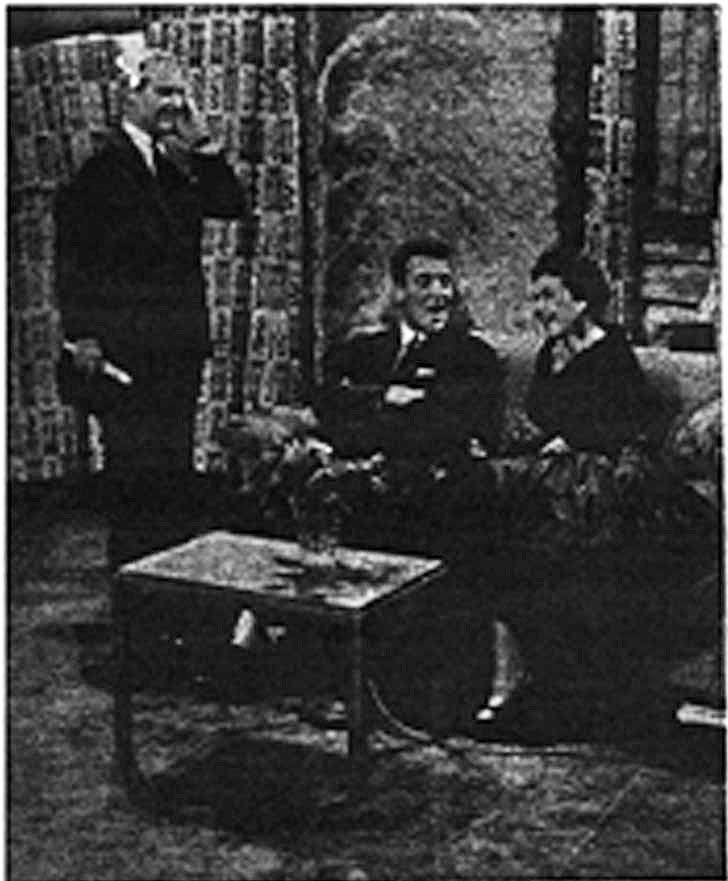
Jackson's ability to move fast was put to the test on the first This Is Your Life programme, when the name of the chosen victim, footballer Stanley Matthews, leaked to the press.
Only a few days remained in which to research another life story. Jackson conferred with the executive producer of the American parent show, Axel Gruenberg, the compere of the American show, Ralph Edwards, who was to handle the first British programme, and Eamonn Andrews who was watching Edwards for hints in technique before he himself took over the series. They tossed names around for a while, then Jackson stood up and walked towards the door. He passed behind the sofa on which Andrews was sitting. He caught the attention of Gruenberg and Edwards; then he pointed silently down at the back of Andrews's head. The new victim was chosen.
Though Andrews is one of the best friends, Jackson ruthlessly gave him a day of heartache. He sent Andrews on a wild goose chase while he organised the show behind his back. But Jackson can be even tougher with himself.
One Wednesday night last January, when he was also producing What's My Line?, he was in a collision with a lorry. His driving mirror gashed his eyebrow and he woke up in hospital. The hospital sent him home at 2am on Thursday. He got up at seven thirty and went to his office. He worked until five, then a colleague took him home to bed.
He worked through Friday and Saturday, produced This Is Your Life on the Sunday and What's My Line? on the Monday. On the Tuesday he felt free to collapse.
A neatly typed card on the door of Jackson's office in Shepherd's Bush carries the name "T. Leslie Fruitcake." Inside, a false beard hangs inexplicably from the top of a notice board. Jackson usually works standing at his desk, jacket off, wearing a bow tie at his neck and an ordinary tie round his waist.
He drives his staff hard. "But we feel we are working with, rather than for Jacko," Eileen Cornwell said recently. "I can't think of anyone I'd rather work for."
Terence Leslie Jackson was born in Stretford, Lancashire, of an Irish mother and an English father. When he was eight, he and his seven-year-old brother made jam sandwiches and walked seven miles to Stockport, Cheshire, seven miles from Stockport to Manchester, then home to Stretford, a total of nearly twenty miles.
When their father heard of this marathon, he issued a challenge in a daily paper, saying his sons would take on anybody of the same age at walking. He sent them out training. After a week the project was forgotten.
The family moved to Dublin, where Jackson took his first job in the office of a flour mill. He left and trained as an actor at the Abbey Theatre, boxing as an amateur in his spare time. At seventeen he set out with another boy to stow away to America. They reached Liverpool with £2 between them. But ships to America, they found, were too well guarded. Jackson's friend joined the army. Jackson, who weighed only six stones, was sent away from the recruiting office to put on weight.
He went to Manchester and fought twenty-seven professional fights, winning fifteen and drawing four. He worked in a factory, then sold brushes from door to door. Then he acted in repertory at Manchester, Buxton in Derbyshire and Macclesfield, Cheshire.
He joined the wartime navy, spent eight months in Murmansk, was commissioned and carried stores into Normandy on a landing craft on D-Day.
While acting in Manchester he became friendly with a young Welsh actress whose parents opposed the friendship. For four years of the war they heard nothing of each other. One day the actress went into a store in Manchester, took off her glove and found she had lost a jade stone from her ring. Searching, head down, she bumped into a naval officer. It was Jackson.
"Jo! Are you married?" said Jackson, quick as ever to get right to the heart of things. He married her a few weeks later. Today they have three children, Paul, nine; Sean, seven; and Ceri, nineteen months.
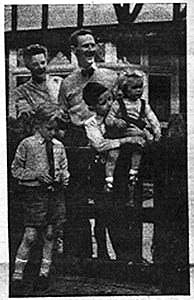
After the war Jackson passed a BBC selection board for the job of studio manager. They asked him when he could start. It was 9am. "Will midday do?" Jackson asked.
Given What's My Line? to produce, he won two awards between 1951 and 1954. The BBC paid him a bonus for his added responsibility, but they were slow to promote him. In 1955, when he was still a studio manager after nine years, the BBC told him he had been away from his duties long enough, and took him off What's My Line? He jibbed at working under producers he considered his juniors, so he transferred from Light Entertainment and worked on documentaries, plays and opera, then directed Television News for six months.
He became a director, still on a studio manager's rate of pay. Commercial television made him an offer. The BBC offered him promotion to producer if he would stay. He stayed.
Jackson hates hurting anybody's feelings. "He is a sucker for cadgers," his wife says.
His effort to avoid appearing rude to a friend got out of hand a few months ago. He had a lunch date with a man on a day when he was exceptionally busy. Rather than say he must return early to the office, he told the man he had to catch a certain train to Horsham, Sussex.
"That's lucky," said Jackson's friend. "I was going there the other day and somebody gave me a lift. I still have the ticket."
Time went on, and Jackson said that he really ought to go, "Don't worry," his friend said, "I'll drive you to the station. You'll catch the train."
By now Jackson was too deeply involved in his deception to withdraw. His friend drove him to the station, gave him a ticket, bought him a batch of magazines and waved him on his way.